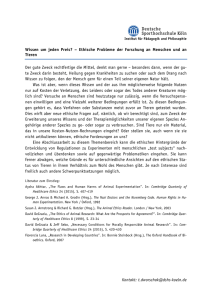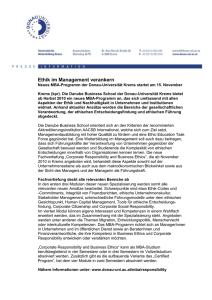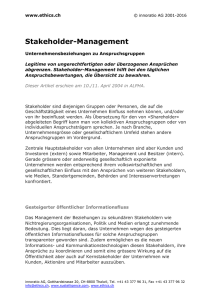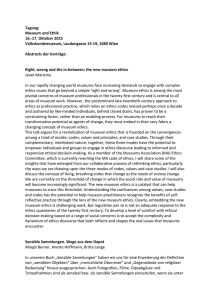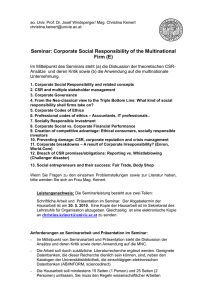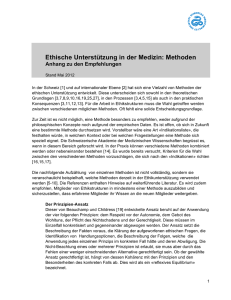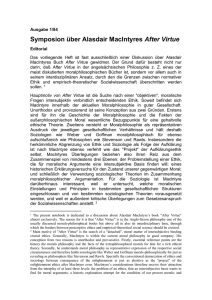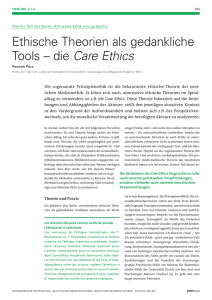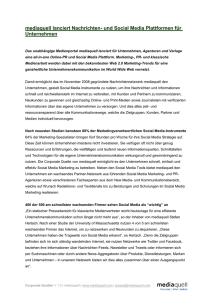13. Social entrepreneurs and their success: Fair Trade, Body Shop
Werbung
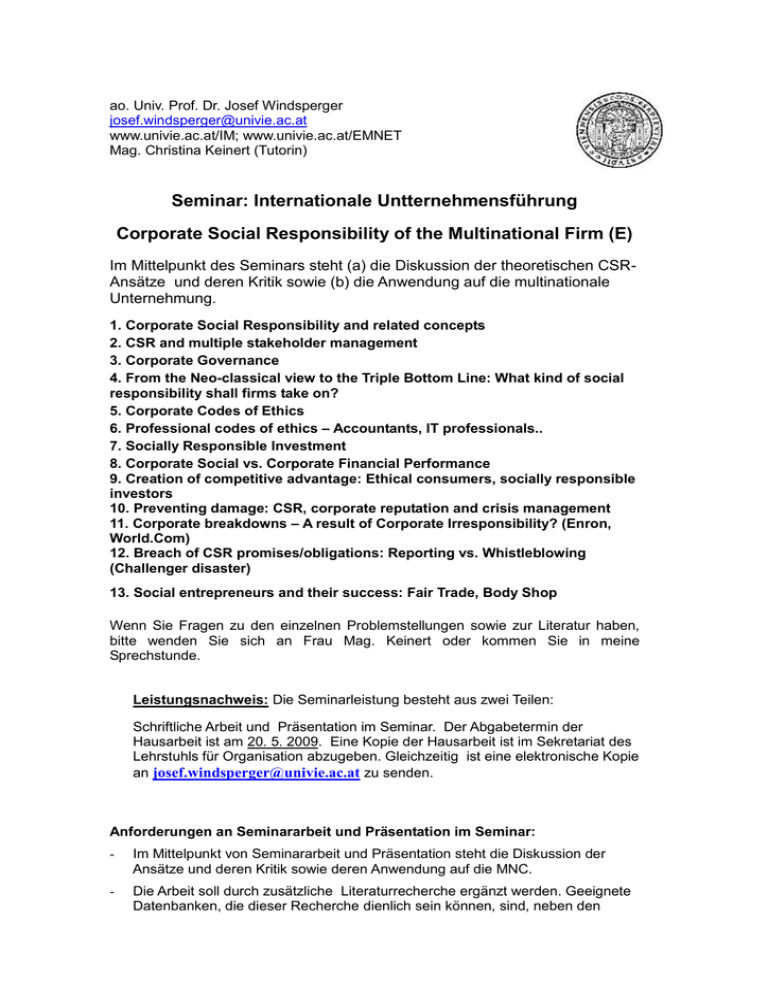
ao. Univ. Prof. Dr. Josef Windsperger [email protected] www.univie.ac.at/IM; www.univie.ac.at/EMNET Mag. Christina Keinert (Tutorin) Seminar: Internationale Untternehmensführung Corporate Social Responsibility of the Multinational Firm (E) Im Mittelpunkt des Seminars steht (a) die Diskussion der theoretischen CSRAnsätze und deren Kritik sowie (b) die Anwendung auf die multinationale Unternehmung. 1. Corporate Social Responsibility and related concepts 2. CSR and multiple stakeholder management 3. Corporate Governance 4. From the Neo-classical view to the Triple Bottom Line: What kind of social responsibility shall firms take on? 5. Corporate Codes of Ethics 6. Professional codes of ethics – Accountants, IT professionals.. 7. Socially Responsible Investment 8. Corporate Social vs. Corporate Financial Performance 9. Creation of competitive advantage: Ethical consumers, socially responsible investors 10. Preventing damage: CSR, corporate reputation and crisis management 11. Corporate breakdowns – A result of Corporate Irresponsibility? (Enron, World.Com) 12. Breach of CSR promises/obligations: Reporting vs. Whistleblowing (Challenger disaster) 13. Social entrepreneurs and their success: Fair Trade, Body Shop Wenn Sie Fragen zu den einzelnen Problemstellungen sowie zur Literatur haben, bitte wenden Sie sich an Frau Mag. Keinert oder kommen Sie in meine Sprechstunde. Leistungsnachweis: Die Seminarleistung besteht aus zwei Teilen: Schriftliche Arbeit und Präsentation im Seminar. Der Abgabetermin der Hausarbeit ist am 20. 5. 2009. Eine Kopie der Hausarbeit ist im Sekretariat des Lehrstuhls für Organisation abzugeben. Gleichzeitig ist eine elektronische Kopie an [email protected] zu senden. Anforderungen an Seminararbeit und Präsentation im Seminar: - Im Mittelpunkt von Seminararbeit und Präsentation steht die Diskussion der Ansätze und deren Kritik sowie deren Anwendung auf die MNC. - Die Arbeit soll durch zusätzliche Literaturrecherche ergänzt werden. Geeignete Datenbanken, die dieser Recherche dienlich sein können, sind, neben den Katalogen der Universitätsbibliothek, die einschlägigen elektronischen Datenbanken (ABIINFORM, sciencedirect). - Die Hausarbeit soll mindestens 15 Seiten (1 Person) und 25 Seiten (2 Personen) umfassen. Sie muss den Regeln wissenschaftlicher Arbeiten entsprechen. Dies gilt insbesondere im Hinblick auf die Vollständigkeit des Literaturverzeichnisse und den Umgang mit Literaturverweisen im Text. - Jede Präsentation darf maximal 40 Minuten dauern. - Wenn das Thema doppelt vergeben ist, wird erwartet, dass sich die Teilnehmer hinsichtlich der Präsentation so abstimmen, dass inhaltliche Doppelungen in den Vorträgen möglichst vermieden werden. Bewertung: Seminararbeit 60 % Präsentation 20 % Anwesenheit und Mitarbeit: 20 % Literatur (Die Literatur ist auf der eLearning-Plattform zu finden (weitere Informationen werden unter www.univie.ac.at/im bekannt gegeben). I. Pflichtliteratur (fuer alle Themen) Buch: Keinert, Christina (2008), Corporate Social Responsibility as an International Strategy, Physica Verlag. - Carroll, Archie B.: “Corporate social responsibility – Evolution of a Definitional Construct”, Business and Society: 38/3, 268-195, 1999. - Garriga, Elisabet; Melé, Domènec: “Corporate Social Responsibility Theories: Mapping the Territory”, Journal of Business Ethics 53: 51-71, 2004. - Frederick, William C: “From CSR1 To CSR2 – The Maturing of Business and Society Thought”, Business and Society 33/ 2: 150-164; 1994. - Balsmaier, Phillip; Kelly, Jennifer: “The Ethics of Sentencing White-Collar Criminals”, Journal of Business Ethics 15: 143-152, 1996. II. Literatur zu den Themen ● Corporate Social Responsibility and related concepts: “Mapping the territory” 2 - Fisher, Josie: “Social Responsibility and Ethics: Clarifying the Concepts”, Journal of Business Ethics 52: 391-400, 2004. - Van Marrewijk, Marcel: “Concepts and Definitions of CSR and Corporate Sustainability: Between Agency and Communion”, Journal of Business Ethics 44: 95–105, 2003. - Frederick, William C: “From CSR1 To CSR2 – The Maturing of Business and Society Thought”, Business and Society 33/2: 150-164; 1994. ● CSR and multiple stakeholder management - Freeman - Hummels, Harry: “Organizing Ethics: A Stakeholder Debate”, Journal of Business Ethics 17: 14031419, 1998. - Neville, Benjamin A.; Menguc, Bulent: “Stakeholder Multiplicity: Toward an Understanding of the Interactions between Stakeholders”, Journal of Business Ethics 66: 377-391, 2006. - Dawkins, Jenny; Lewis, Stewart: “CSR in Stakeholder Expectations: And Their Implication for Company Strategy”, Journal of Business Ethics 44: 185-193, 2003. ● Corporate Governance: - Boyd, Colin: “Ethics and Corporate Governance: The Issues Raised by the Cadbury Report in the United Kingdom”, Journal of Business Ethics 15: 167–182, 1996. - Vera-Munoz, Sandra C.: “Corporate Governance Reforms: Redefined Expectations of Audit Committee Responsibilities and Effectiveness”, Journal of Business Ethics 62: 115–127, 2005. - West, Andrew: “Theorising South Africa’s Corporate Governance”, Journal of Business Ethics 68: 433–448, 2006. - Di Lorenzo, Vincent: “Business Ethics: Law As A Determinant of Business Conduct”, Journal of Business Ethics 71:275–299, 2007. ● From the Neo-classical view to the Triple Bottom Line: What kind of social responsibility shall firms take on? - Wagner-Tsukamoto, Sigmund: “Moral Agency, Profits and the Firm: Economic Revisions to the Friedman Theorem“, Journal of Business Ethics 70: 209–220, 2007. - Pinkston, Tammie S.; Carroll, Archie B.: “A Retrospective Examination of CSR Orientations: Have They Changed?”, Journal of Business Ethics 15: 199-206, 1996. - Sarre, Rick; Doig, Meredith; Fiedler, Brenton: “Reducing The Risk of Corporate Irresponsibility: The Trend To Corporate Social Responsibility”, Accounting Forum 25/3: 300-317, 2001. - Van Marrewijk, Marcel; Were, Marco: “Multiple Levels of Corporate Sustainability”, Journal of Business Ethics 44: 107-119, 2003. ● Corporate Codes of Ethics – Are they any good? - Schwartz, Mark S.: “Effective Corporate Codes of Ethics: Perceptions of Code Users”, Journal of Business Ethics 55: 323-343, 2004. - Hunter, Trevor; Bansal, Pratima: “How Standard is Standardized MNC Global Environmental Communication?”, Journal of Business Ethics 71:135–147, 2007. - Kaptein, Muel: “Business Codes of Multinational Firms: What Do They Say?”, Journal of Business Ethics 50: 13-31, 2004. 3 - Vitell, Scott J.; Ramos Hidalgo, Encarnación: “The Impact of Corporate Ethical Values and Enforcement of Ethical Codes on the Perceived Importance of Ethics in Business: A Comparison of U.S. and Spanish Managers”, Journal of Business Ethics 64: 31–43, 2006. ● Professional codes of ethics – Accountants, IT professionals.. - Brown, Phil A.; Stocks, Morris H.; Wilder, W. Mark: “Ethical Exemplification and the AICPA Code of Professional Conduct: An Empirical Investigation of Auditor and Public Perceptions”, Journal of Business Ethics 71: 39–71, 2007. - Emerson, Tisha L. N.; Conroy, Stephen J.; Stanley, Charles W.: “Ethical Attitudes of Accountants: Recent Evidence from a Practitioners’ Survey”, Journal of Business Ethics 71: 73–87, 2007. - Brooks, Leonard J.: “Ethical Codes Of Conduct: Deficient In Guidance For The Canadian Accounting Profession”, Journal of Business Ethics 8: 325-335, 1989. - Jin, K. Gregory; Drozdenko, Ron; Bassett, Rick: „Information Technology Professionals’ Perceived Organizational Values and Managerial Ethics: An Empirical Study”, Journal of Business Ethics 71:149–159, 2007. ● Socially Responsible Investment - Greig A. Mill: “The Financial Performance of a Socially Responsible Investment Over Time and a Possible Link with Corporate Social Responsibility”, Journal of Business Ethics 63: 131–148, 2006. - Benson, Karen L.; Brailsford, Timothy J.; Humphrey, Jacquelyn E.: “Do Socially Responsible Fund Managers Really Invest Differently?”; Journal of Business Ethics 65: 337–357, 2006. - Sparkes, Russell; Cowton, Christopher J: “The Maturing Of Socially Responsible Investment: A Review Of The Developing Link With Corporate Social Responsibility”, Journal of Business Ethics 52: 45-57, 2004. - Sethi, S. Prakash: “Investing in Socially Responsible Companies is a Must for Public Pension Funds – Because There is no Better Alternative”; Journal of Business Ethics 56: 99–129, 2005. ● Corporate Social vs Corporate Financial Performance - Verschoor, Curtis C.: “A Study of The Link Between a Corporation’s Financial Performance and Its Commitment to Ethics”, Journal of Business Ethics 17: 1509-1516, 1998. - Scholtens, Bert: “Finance as a Driver of Corporate Social Responsibility”, Journal of Business Ethics 68:19–33, 2006. - Orlitzky, Marc: “Does Firm Size Confound The Relationship Between Corporate Social Performance and Firm Financial Performance?”, Journal of Business Ethics 33: 167-180, 2001. ● Creation of competitive advantage: Ethical consumers, socially responsible investors - Picou, Armand; Rubach, Michael J.: “Does Good Governance Matter to Institutional Investors? Evidence from the Enactment of Corporate Governance Guidelines”, Journal of Business Ethics 65: 55–67, 2006. - Hummels, Harry; Timmer, Diederik: „Investors in Need of Social, Ethical and Environmental Information”, Journal of Business Ethics 52/1: 73-84, 2004. - Crane, Andrew: “Unpacking the Ethical Product”, Journal of Business Ethics 30: 361–373, 2001. - Auger , Pat; Deviney, Timothy M.; Louviere, Jordan J.: “What will consumers pay for social product features?”, Journal of Business Ethics 42/3: 281-304, 2004. ● Preventing damage: CSR, corporate reputation and crisis management 4 - Roberts, P.W.; Dowling, G.R.: “Corporate Reputation and Sustained Superior Financial Performance”, Strategic Management Journal 23: 1077-1093, 2002. - Sadler, David: “Anti-corporate Campaigning and Corporate ‘‘Social’’ Responsibility: Towards Alternative Spaces of Citizenship?”, Editorial Board of Antipode, 851-870, 2004. - Zyglidopoulos, Stelios C. „The Social and Environmental Responsibilities of Multinationals: Evidence from the Brent Spar Case“, Journal of Business Ethics 36: 141-151, 2002. - Seeger, Matthew W.; Ulmer, Robert R.: “Virtuous Responses to Organizational Crises: Aaron Feuerstein and Milt Cole”, Journal of Business Ethics 31: 369-376, 2001. Corporate breakdowns – A result of Corporate Irresponsibility? (Enron, World.Com) - Cagle, Julie A. B.; Baucus, Melissa S.: “Case Studies of Ethics Scandals: Effects on Ethical Perceptions of Finance Students”, Journal of Business Ethics 64: 213–229, 2006. - Kaplan, Steven E.; Roush, Pamela B.; Thorne, Linda: “Andersen and the Market for Lemons in Audit Reports”, Journal of Business Ethics 70: 363–373 2007. - VanSandt, Craig V.; Shepard, Jon M.; Zappe, Stephen M.: “An Examination of the Relationship Between Ethical Work Climate and Moral Awareness”, Journal of Business Ethics 68: 409–432, 2006. - Davis, Anne L.; Rothstein, Hannah R.: “The Effects of the Perceived Behavioral Integrity of Managers on Employee Attitudes: A Meta-analysis”, Journal of Business Ethics 67: 407–419, 2006. ● Breach of CSR promises/obligations: Reporting vs. Whistleblowing (Challenger disaster) - Hassink, Harold; de Vries, Meinderd; Bollen, Laury: “A Content Analysis of Whistleblowing Policies of Leading European Companies”, Journal of Business Ethics, 2007. - Dworkin, T. M. and M. S. Baucus: “Internal vs.External Whistleblowers: A Comparison of Whistleblowing Processes”, Journal of Business Ethics 17/12: 1281–1298, 1998. - Mesmer-Magnus, Jessica R.; Viswesvaran, Chockalingam: “Whistleblowing in Organizations: An Examination of Correlates of Whistleblowing Intentions, Actions, and Retaliation”; Journal of Business Ethics 62: 277–297, 2005. - Kaplan, Steven E.; Schultz, Joseph J.: “Intentions to Report Questionable Acts: An Examination of the Influence of Anonymous Reporting Channel, Internal Audit Quality, and Setting”; Journal of Business Ethics 71:109–124, 2007. - Kuhn, James W.: “Emotion As Well As Reason: Getting Students Beyond “Interpersonal Accountability” ”, Journal of Business Ethics 17: 295-308, 1998. [on Challenger disaster] ● Social entrepreneurs and their success: Fair Trade, Body Shop - Hartman, Cathy L; Beck-Dudley, Caryn L: “Marketing strategies and the search for virtue: A case analysis of the Body Shop, International”, Journal of Business Ethics; 20/3: 249-263, 1999. - Sillanpaa, Maria: “The Body Shop values report - Towards integrated stakeholder auditing”, Journal of Business Ethics 17: 1443-1456, 1998. - Hira, Anil; Ferrie, Jared: “Fair Trade: Three Key Challenges for Reaching the Mainstream”; Journal of Business Ethics 63: 107–118, 2006. - Wempe, Johan: “Ethical Entrepreneurship and Fair Trade”, Journal of Business Ethics 60: 211220, 2005. 5
